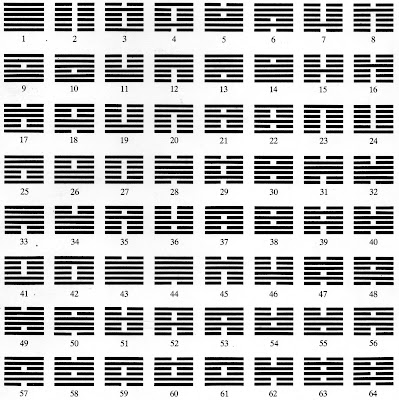

Despite magical attributions, the I Ching may be the only math-based ritual mythology for understanding our position in the universe. Hexagrams are constructed by chance, but order is the result. The mathmatics of the I Ching, plus a multitude of dubious interpretations, can be found in books and on the Internet.
Origin myths
Among the basic questions raised by human beings is that of origins. How did people come to exist? How was the earth created? What about the sun, moon, and the stars? Why do people die? No human society lacks answers to such questions. While the answers vary in detail, they are similar: people and the world exist because they were brought into being by a series of creative acts. Creation is usually regarded as the work of supernatural beings who command earthly forces and seasonal changes, the movements of heavenly bodies, as well as procreation. The accounts of the ways in which supernatural agents formed the earth and populated it are known as origin myths. For Christians, Oriental (Middle Eastern) myth as collected in the book of "Genesis" is the first and last explanation for creation, but this source is alien to European cultures and an inadequate text for modern life.
Until the invention of scientific inquiry, origin myths were the only answer to big questions: these stories continue to influence religion, literature, politics, national identities, subcultures, and individuals. In the United States, belief in the literal truth of Biblical myth obstructs non-religious activity, from scientific research to medical procedures, to social programs and liberal education. Learning to read is not a religious or political act, nor is studying biology, but real world education is under attack by people whose ideas are limited to archaic beliefs about the environment and human potential.


Nature's original form: a screw-shaped Bryozoan. Archimedes Screw: a device based on the mathmatical description of the natural form, repurposed to lift water. A simple but brilliant step taken by an individual - Archimedes - in understanding how the world works.
"Give me a lever long enough and a fulcrum on which to place it and I shall move the world." Archimedes, ca. 287-212 BCE
We should not forget that during the first millennium BCE, when the ancient world was engulfed by supernatural belief, magic, and fear, a handful of Greeks began the process of demythologizing nature; this was truly a radical departure in how human beings use the brain.
A profound shift in awareness is marked by the ability of Archimedes to project his mind into empty space: to imagine the earth as a spherical body suspended in the void, and to realize that in space there is no solid spot on which to stand. A flat, man-centered universe was suddenly expanded into a three-dimensional model of objects that are related mathematically. For many Americans living 2300 years later, this remains unknown and forbidden knowledge.
The intellectual tradition of the Western world begins with Greek philosophy, and not with the Biblical condemnation of man as a disobedient child who must be controlled by a despotic parent. The relationship between the Ancient Greek and his environment was based on reason and proportion. Man is seen as capable of self-examination and self-correction, and he can improve his behavior by developing his mind and culture. The gods, although arrogant with power, were not exempt from nature's laws.
This staggering revolution in thought began in Greece. Why there and then? Greeks lived in small city-states where debate was accepted and rational thought was viewed as a tool, one that was as valuable as any axe or sword. In stark contrast to the Oriental picture of man as a degraded being who lives in terror and never gets off his knees, the individual was developed as a powerful new idea: the Greek hero died to restore balance to his world, and a single man could improve mankind by trusting in his ability to develop his mind through learning. In stark contrast, the Christian idea of salvation is passive: a supernatural being removes man from physical reality and transports him to a nonexistent dimension, and in the process exempts him from responsibility for his actions. Judeo-Christian man is a puppet; the Greek pagan takes responsibility for his response to fate.
Two thousand tears ago the Greeks asked a question that today remains heretical for supernatural thinkers: "What is truly real?" They distinguished noumenon, the reality behind what we see, from phenomenon, or apparent reality. This concept of a stand-alone universe beyond our senses eludes many people today, and yet this distinction made our culture possible.